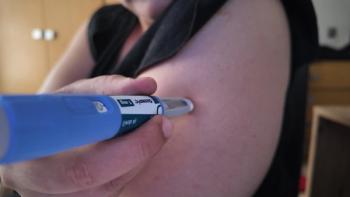
NX-5948 Gets FDA Fast Track Designation for Relapsed/Refractory CLL/SLL
A fast track designation has been granted by the FDA to the novel BTK degrader, NX-5948, for adults with relapsed or refractory chronic lymphocytic leukemia or small lymphocytic lymphoma who were treated with at least two lines of therapy, including a BTK inhibitor and a BCL2 inhibitor.
The novel BTK degrader, NX-5948, has received a fast track designation from the FDA for adult patients with relapsed or refractory chronic lymphocytic leukemia (CLL) or small lymphocytic lymphoma (SLL) who were treated with at least two lines of therapy, including a BTK inhibitor and a BCL2 inhibitor.1
The investigational, orally administered, small molecule degrader was designed to bind to BTK and the cereblon E3 ligase complex. This results in the degradation of both wild-type and mutated forms of BTK.2
Nurix has previously reported that NX-5948 is highly potent against a range of tumor cell lines with BTK inhibitor–resistance, which is an important consideration for heavily pretreated patients with CLL/SLL.1
Additionally, NX-5948 demonstrated clinically meaningful on-target effects and tolerability in patients with relapsed/refractory B-cell malignancies in the dose-escalation portion of the phase 1 NX-5948-301 trial (NCT05131022). Preliminary data from this trial were reported during the
At the October 17, 2023, data cutoff, 6 patients in the CLL population (n = 7) who received doses of NX-5948 ranging from 50 mg to 200 mg experienced clinical benefit, 3 of whom achieved ongoing partial responses (PR).1,2 Moreover, 3 patients achieved stable disease, with treatment ongoing in 2 patients. Notably, all patients exhibited evidence of lymph node reduction.2
NX-5948 was well tolerated across all dose levels. No dose-limiting toxicities, treatment-related serious adverse effects, or treatment-emergent adverse effects (TEAEs) that resulted in drug discontinuation were observed. There was no incidence of atrial fibrillation or hypertension.1,2
“Fast track designation for NX-5948 is an important recognition of the unmet patient need in CLL, particularly in the growing number of patients whose cancer has progressed following BTK and BCL2 inhibitor therapy,” Arthur T. Sands, MD, PhD, president and chief executive officer of Nurix, stated in a news release. “This designation follows encouraging safety and efficacy data from our ongoing phase 1 clinical trial, demonstrating early promise of clinical benefit with potential for durable outcomes.”
The first-in-human, dose-escalation and cohort-expansion NX-5948-301 trial is currently investigating the agent’s safety and clinical activity in adult patients with the following relapsed/refractory B-cell malignancies: CLL, SLL, Waldenström macroglobulinemia, mantle cell lymphoma, marginal zone lymphoma, follicular lymphoma, diffuse large B-cell lymphoma, and primary central nervous system lymphoma.2
Patients aged 18 years and older with histologically confirmed, measurable or evaluable B-cell malignancies were included in the study. Other key inclusion criteria were an ECOG performance score of 0 or 1, and exposure to 2 or more prior lines of therapy.2,3
The study employed a parallel 3+3 dose-escalation design. Notably, the phase 1b portion will include up to four expansion cohorts. Approximately 110 patients (30 in phase 1a and 80 in phase 1b) may be enrolled on the trial to receive oral NX-5948 once daily in 28-day cycles until disease progression or unacceptable toxicity.2
The study’s primary end points in the dose-escalation phase were the incidence of dose-limiting toxicities and TEAEs, as well as establishing either the recommended phase 1b dose and/or the maximum tolerated dose. Primary end points in the phase 1b portion were safety and anti-tumor activity.3
The study is actively enrolling patients across all indications in the United States, the United Kingdom, and the Netherlands. Additional data with the agent at higher dose levels and longer treatment duration are expected to be reported in 2024.1 The study has an estimated completion date of January 2027.3
“The receipt of fast track designation is especially timely given our plans to accelerate enrollment in the phase 1 trial of NX-5948 with the goal of enabling a pivotal study for NX-5948 as rapidly as possible,” Sands concluded in the news release.
References
- Nurix Therapeutics receives U.S. FDA fast track designation for NX-5948 for the treatment of relapsed or refractory CLL and SLL. News release. Nurix Therapeutics. January 16, 2024. Accessed January 17, 2024.
https://finance.yahoo.com/news/nurix-therapeutics-receives-u-fda-210100427.html - Searle E, Forconi F, Linton K et al. Initial findings from a first-in-human phase 1a/b trial of NX-5948, a selective Bruton’s tyrosine kinase (BTK) degrader, in patients with relapsed/refractory B cell malignancies. Blood. 2023;142(suppl 1):4473. doi:10.1182/blood-2023-179508
- A study of NX-5948 in adults with relapsed/refractory B-cell malignancies. ClinicalTrials.gov. Updated January 10, 2024. Accessed January 17, 2024.
https://clinicaltrials.gov/study/NCT05131022
Newsletter
Knowledge is power. Don’t miss the most recent breakthroughs in cancer care.






























































































